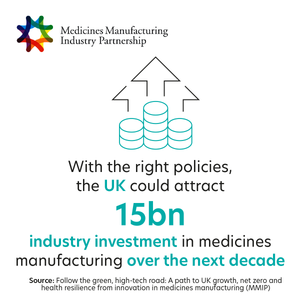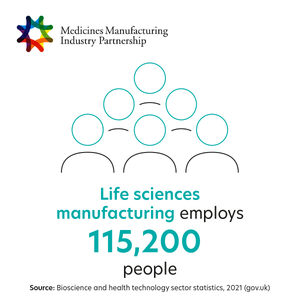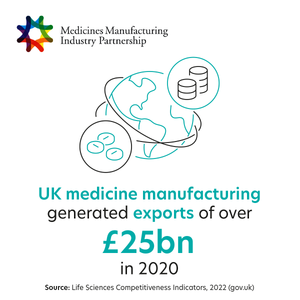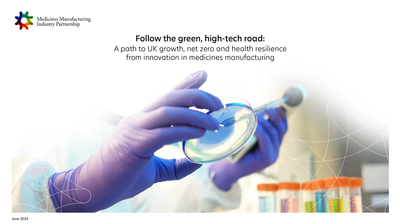MMIP report: Follow the green, high-tech road
A path to UK growth, net zero and health resilience from innovation in medicines manufacturing
A vision for 2030 and beyond
Medicines manufacturing delivers the largest share of economic activity within the UK life sciences sector. Notwithstanding the strength of UK medicines research and development, it is manufacturing that generates the majority of the life sciences jobs and revenues that power the UK economy. The diverse geographic footprint of medicines manufacturing facilities across the UK also means the sector contributes high-quality, well-paid jobs in traditionally less prosperous areas.
For the UK to achieve the status of a global life sciences superpower, it must maximise its participation in this vibrant global growth sector. Every effort should be made to ensure not just that we discover and develop the medicines of the future, but that we make a significant share of them in the UK too.
The manufacture and supply of advanced medicines is rapidly changing, offering a huge opportunity for the UK. In this report, Medicines Manufacturing Industry Partnership (MMIP) calls for focused action for medicines manufacturing in key areas that build on the work of recent years and accelerates progress in improving the UK’s competitive position versus other potential investment locations.
MMIP believes the UK can be recognised as the best global location for innovative and environmentally sustainable medicines manufacturing, delivering health security and nationwide economic prosperity. This paper sets out a series of targeted policy recommendations which, if adopted, could reasonably be expected to attract a portfolio of new investments worth around £1.5 billion each year over the next decade, creating 26,500 new jobs in the sector and supporting 90,100 jobs in the wider economy.



Medicines manufacturing has been a traditional strength for the UK, which in recent years has performed particularly strongly in the Advanced Therapy Medicinal Products (ATMPs) sector. However, other leading destinations for medicines manufacturing investment such as Ireland, Singapore, France and the US have performed strongly. They are driving intense competition with ambitious, well-funded government support in place.
Manufacturing investments have long lead times and, once made, are “sticky”, anchoring future activity due to the significant investment in physical infrastructure and specialist workforce requirements. The UK must plan for 2030 and beyond, focusing on future healthcare and economic needs and ensuring the right government support is consistently in place over several years to deliver a competitive global performance.
The innovative path to growth
The rapid pace of medical innovation is having profound consequences for medicines manufacturing. Severe medical conditions are increasingly being treated with highly innovative advanced therapies. Making these therapies requires new approaches and, as a result, manufacturing innovation is fundamental. Countries that create a strong manufacturing innovation ecosystem will attract the greatest investment from life sciences companies.
.png)
.png)
